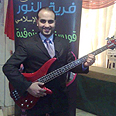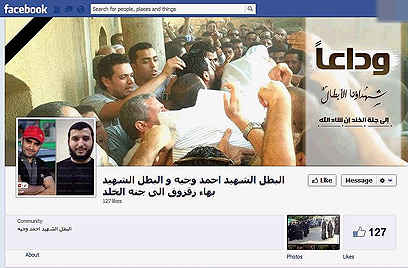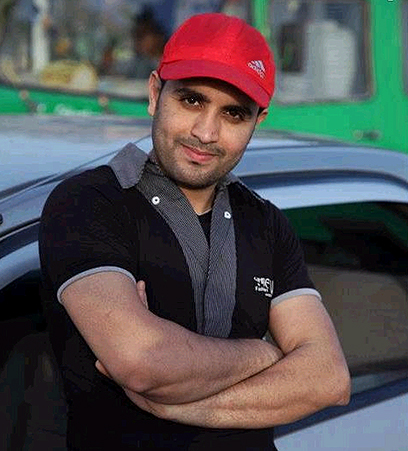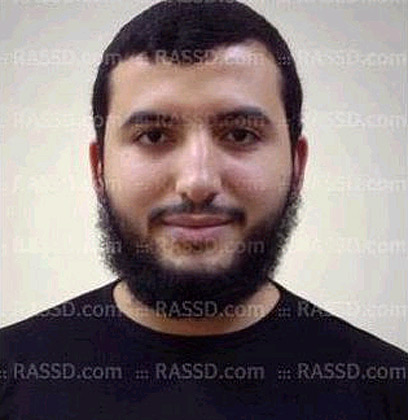
The new Egyptian terrorist: Young, educated father
Contrary to previous assessments, attack that left IDF Corporal Nettanel Yahalomi dead was not work of Bedouins, but of family men no one suspected as Jihad supporters
Israel and Egypt are both investigating the border clash that claimed the life of IDF Corporal Netanel Yahalomi in mid September. Recent information, however, has lead to the conclusion that the attack was not the work of radical Bedouins, but of Egyptian family men no one suspected were Jihad supporters.
The last few days have seen the Egyptian media try to uncover as much information about the two known terrorist. The identity of the third gunmen is still unknown, as his remains have made the identification process difficult.
Related stories:
- Op-ed: IDF must boost Sinai intel
- Militants attack peacekeeper base in Sinai
- Barak mulls law to shut crossing into Sinai
Egypt's media maintains that the information discovered so far will surprise not only Cairo's intelligence services, but their Israeli counterparts, as well.
The two known gunmen have been identified as Ahmad Wajiya, 31, the lead singer of a religious music group and a father of two; and his cousin, Bahaa Zakzuk, 25, who holds a degree in literature and was the father of a little boy.

Facebook page created in memory of two terrorists
According to Egypt's Al-Yum Al-Saba newspaper, the two lived in the Mit Hakan neighborhood of El-Manuffia region.
Both were considered to be members of a respectable, upscale Egyptian family. Egyptian authorities believe both turned into radical Jihadists after becoming members of an extremist mosque in Cairo. They told their families they were attending a religious summer camp.
The 'new terrorist'
The information revealed by the Egyptian authorities so far compiles a new profile of Egyptian terrorists – a new threat Israel will have to deal, against the backdrop of the lax security at the Sinai Peninsula.
The two's story, as revealed Saturday by Cairo's Al-Aharam newspaper, raises several concerns about this new brand of potential threat.

Ahmad Wajiya
Zakzuk, a literature graduate of El-Manuffia University, married and a father; was the youngest child of a devout family. One of his sisters is married to a known Islamic preacher.
A former member of the Muslim Brotherhood, he recently joined the Salafi movement headed by presidential hopeful Hazam Abu-Ismail.
Wajiya, married and father of two daughters, was the elder brother in his family. Relatives said he was musically gifted and performing in religious events as the lead singer of the Islamic band "A-Nur."
'Victims of perverted ideas'?
The Mit Hakan neighborhood has been in mourning since the attack, the residents refusing to believe the two's devotion led them down a radical path.
Egyptian media quoted Morsi Abdel Halak, the two's uncle as saying that they were victims of organizations spreading extreme religious ideas: "These ideas quickly took over their minds."
Halak urged authorities to fight these ideas, saying that mosques spreading them "kidnapped Bahaa Zakzuk and Ahmad Wajiya from the bosoms of their families." The cousins were recruited by senior member of the Ansar Beit el-Makdas organization via the internet, he said.
Al-Aharam quoted another relative as saying that Wajiya and Zakzuk were recruited by an individual he referred to as "the missing link" in the investigation, who sent them to a mosque known for its extremist teachings, located at the Nasar neighborhood in Cairo.
Wajiya and Zakzuk reportedly spent months at the mosque prior to the Sinai attack. Their families knew only that they were attending a "religious summer camp."
Cairo perplexed by Sinai situation
The terror activity emanating from the heart of Egypt – and not the know terror hubs of Sinai – is causing great embarrassment to the new regime, and is a great cause for concern in Israel, as well.

Bahaa Zakzuk
Professor Yoram Meital, an expert in Middle Eastern affairs from Ben-Gurion University, who specializes in Egypt, claims Egyptian intelligence must focus its action at the heart of Egypt.
"Security and public order systems collapsed with Mubarak's downfall, causing all sorts of extremists groups, previously lacking a framework, to find a new arena of operation.
"There are plenty of voices and preachers holding extreme views that have found new audiences since Mubarak's downfall, because the pressure once applied by the Egyptian intelligence services has loosened nearly completely."
Scene of attack in Mount Harif (Photo: Roee Idan)
Even since Egypt's new president Mohammed Morsi was elected, Meital added, he has been trying to convey that in spite of the fact that Egypt is now ruled by Islamic movement, he has no intentions of giving the various Jihad groups a carte blanche.
"Cairo's intelligence is slowly trying to regain control but it is a very tough battlefield. It will take them long time to deal with it, though the effects of harsher court sentences and intelligence supervision is starting to show."
Prior to the end of the Mubarak regime radical movements in Egypt operated under larger proxies, such as the al-Gama'a al-Islamiya movement, but since the revolution, local and junior operatives have begun using Jihad rhetoric, sprouting the "lone wolf" phenomenon, he added.
"Wajiya and Zakzuk have families, and are not 18 years old boys acting out on momentary enthusiasm. The collapsing order enabled people with extreme views to operate, the fringe of which we are seeing now."
Asked how will the Morsi administration deal with the situation, Meital said: "I assume we shall see more and more collisions between local Jihad groups and the Muslim Brotherhood's regime."
- Receive Ynetnews updates directly to your desktop











